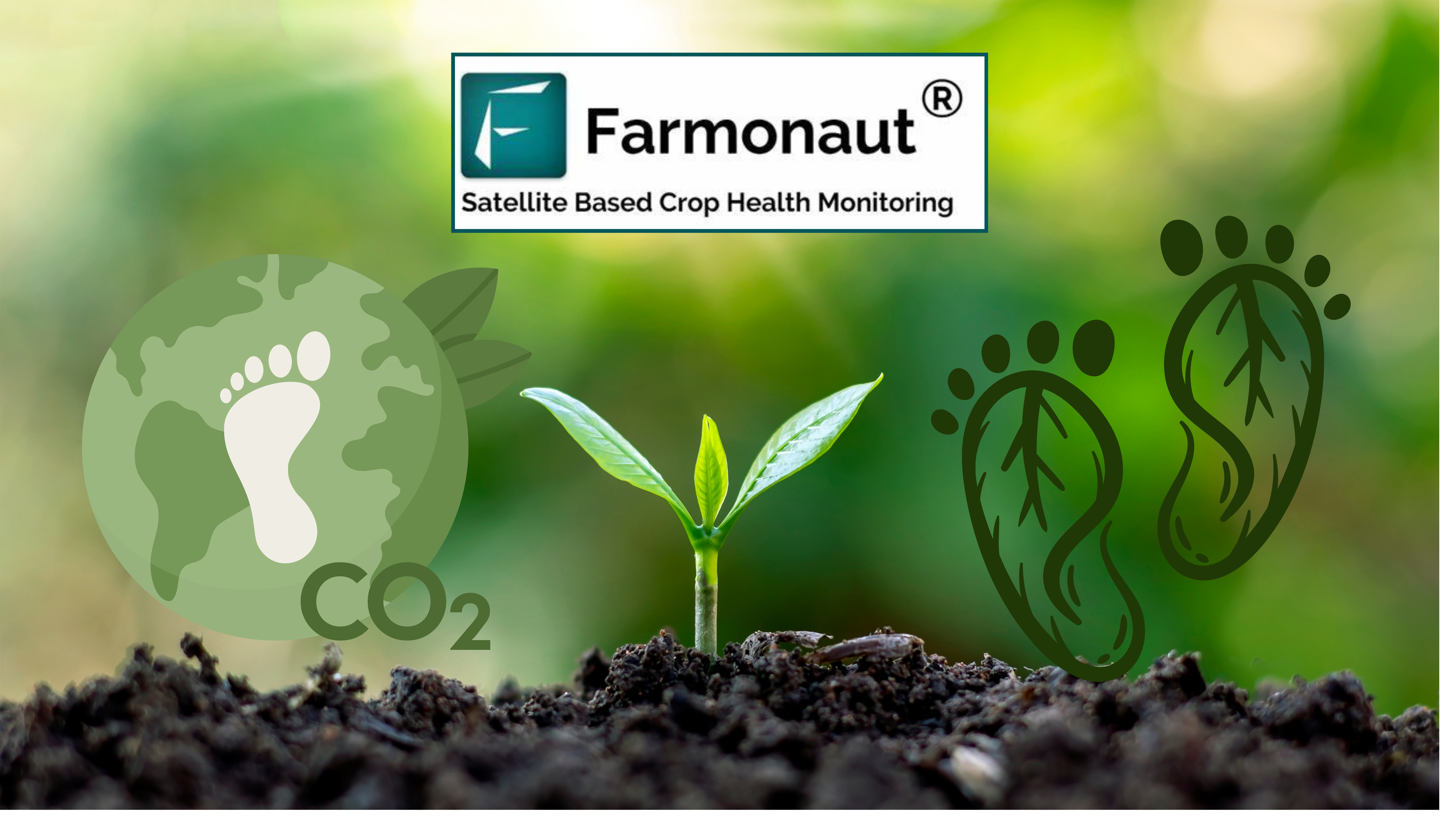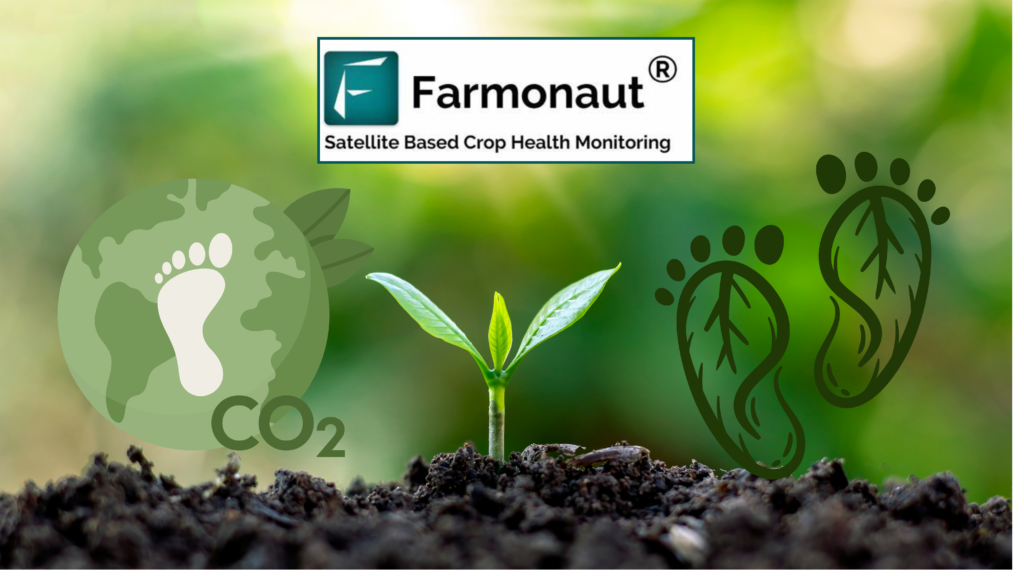
Revolutionizing Sustainable Agriculture: Farmonaut’s Organic Carbon Data Achieves Remarkable Accuracy
At Farmonaut, we’re thrilled to announce a groundbreaking achievement in our mission to promote sustainable farming practices and contribute to a greener future. Our satellite-provided organic carbon data for farms in Madhya Pradesh and Jammu & Kashmir has been verified to align with on-the-ground results with an outstanding 90-95% accuracy!
This milestone not only underscores our dedication to sustainable farming practices but also highlights the immense potential of satellite technology in revolutionizing agriculture. We’re honored to contribute to this significant development and grateful for the collaboration with FairClimateFund that made this validation possible.
The Importance of Organic Carbon in Soil
Before we delve into the details of our achievement, let’s understand why organic carbon content in soil is crucial for sustainable agriculture:
- Soil Health: Organic carbon is a key indicator of soil health and fertility.
- Water Retention: It improves the soil’s ability to retain water, reducing irrigation needs.
- Nutrient Availability: Organic carbon enhances nutrient availability for plants.
- Climate Change Mitigation: Soil organic carbon plays a vital role in carbon sequestration, helping to mitigate climate change.
The Farmonaut Advantage: Satellite-Based Monitoring
At Farmonaut, we leverage advanced satellite technology to provide accurate, real-time data on various aspects of farm management, including organic carbon content. Here’s how our system compares to other monitoring methods:
| Feature | Farmonaut Satellite System | Drone-based Monitoring | IoT-based Monitoring |
|---|---|---|---|
| Coverage Area | Large scale (global) | Limited (local) | Limited (local) |
| Data Frequency | Regular updates (every few days) | On-demand (requires manual flight) | Continuous |
| Cost-effectiveness | High | Moderate | Low (high initial investment) |
| Ease of Use | User-friendly interface | Requires trained operators | Requires technical expertise |
| Data Accuracy | High (90-95% verified) | High (but limited coverage) | High (but limited coverage) |
Our Collaboration with FairClimateFund
Our recent achievement wouldn’t have been possible without our collaboration with FairClimateFund. We extend our heartfelt gratitude to Archit Batra, Sr. Carbon Business Developer at Fair Climate Fund, for his vital role in validating our data’s accuracy.
This partnership exemplifies the power of collaboration in driving sustainable agricultural practices and combating climate change. By combining our satellite technology with FairClimateFund’s expertise in carbon offsetting, we’re paving the way for more effective and efficient carbon management in agriculture.
The Impact of Accurate Organic Carbon Data
The high accuracy of our organic carbon data has far-reaching implications for sustainable agriculture:
- Improved Soil Management: Farmers can make more informed decisions about soil amendments and conservation practices.
- Enhanced Carbon Sequestration: Accurate data allows for better strategies to increase soil carbon storage, contributing to climate change mitigation.
- Optimized Resource Use: Precise organic carbon measurements help farmers optimize fertilizer use, reducing costs and environmental impact.
- Support for Carbon Markets: Accurate data facilitates participation in carbon credit programs, providing additional income for farmers practicing sustainable agriculture.
The Science Behind Organic Carbon in Soil
Understanding the science of organic carbon in soil is crucial for appreciating its importance in sustainable agriculture. Let’s explore some key aspects:
What is Organic Carbon?
Organic carbon in soil refers to the carbon stored in organic matter, which includes plant and animal residues at various stages of decomposition. It’s a vital component of soil health and plays a crucial role in various soil functions.
The Organic Carbon in Soil Range
The organic carbon in soil range can vary significantly depending on factors such as climate, vegetation, soil type, and land management practices. Typically, agricultural soils contain between 0.5% to 5% organic carbon. However, some soils, particularly those in natural ecosystems or under sustainable management, can have much higher levels.
Organic Carbon Benefits
The organic carbon benefits for soil and agriculture are numerous:
- Improved Soil Structure: Organic carbon helps bind soil particles together, creating a stable soil structure that resists erosion.
- Enhanced Water Retention: Soils rich in organic carbon can hold more water, reducing the need for irrigation and improving drought resistance.
- Increased Nutrient Availability: Organic matter serves as a reservoir for essential plant nutrients, releasing them slowly over time.
- Boosted Microbial Activity: Higher organic carbon levels support a diverse and active soil microbial community, which is essential for nutrient cycling and plant health.
- Carbon Sequestration: Increasing soil organic carbon is an effective way to remove carbon dioxide from the atmosphere, mitigating climate change.
Sustainable Farming Practices to Increase Soil Organic Carbon
At Farmonaut, we’re committed to promoting sustainable farming practices that enhance soil organic carbon. Here are some effective strategies:
- Cover Cropping: Planting cover crops during fallow periods helps add organic matter to the soil and prevents erosion.
- Reduced Tillage: Minimizing soil disturbance helps preserve soil structure and retain organic matter.
- Crop Rotation: Diversifying crops can improve soil health and increase organic carbon inputs.
- Organic Amendments: Adding compost, manure, or other organic materials can significantly boost soil organic carbon.
- Agroforestry: Integrating trees into agricultural landscapes can increase carbon sequestration both above and below ground.
How Farmonaut’s Technology Supports Sustainable Agriculture
Our satellite-based technology plays a crucial role in promoting and implementing sustainable farming practices:
- Real-time Monitoring: Our Farmonaut app provides farmers with up-to-date information on soil health, including organic carbon content.
- Data-driven Decision Making: By accessing accurate soil data through our API, farmers can make informed decisions about soil management practices.
- Precision Agriculture: Our technology enables targeted interventions, optimizing resource use and minimizing environmental impact.
- Progress Tracking: Farmers can monitor the impact of their sustainable practices over time, seeing tangible results of their efforts.
Download our app for Android or iOS to start your journey towards more sustainable farming today!
The Future of Sustainable Agriculture with Farmonaut
As we celebrate this milestone in data accuracy, we’re more motivated than ever to push the boundaries of what’s possible in sustainable agriculture. Our vision for the future includes:
- Expanded Coverage: We aim to provide our high-accuracy organic carbon data to more regions, helping farmers worldwide adopt sustainable practices.
- Enhanced AI Integration: We’re continuously improving our AI algorithms to provide even more precise and actionable insights to farmers.
- Collaboration with Carbon Markets: We’re exploring partnerships to help farmers monetize their sustainable practices through carbon credits.
- Education and Outreach: We’re committed to educating farmers about the importance of soil organic carbon and sustainable farming practices.
Join Us in Creating a Greener Future
The achievement of 90-95% accuracy in our organic carbon data is just the beginning. We invite farmers, agribusinesses, and sustainability enthusiasts to join us in our mission to revolutionize agriculture and create a greener future.
By leveraging our accurate data and cutting-edge technology, we can work together to increase soil organic carbon, improve crop yields, and combat climate change. Let’s keep pushing forward for a more sustainable and prosperous agricultural sector!
Interested in harnessing the power of satellite technology for your farm or agribusiness? Check out our subscription options:
For Developers: Integrate Farmonaut’s Data into Your Applications
Are you a developer working on agricultural or environmental applications? Our robust API allows you to integrate our high-accuracy soil and weather data into your own systems. Check out our API documentation to get started!
Frequently Asked Questions (FAQ)
Q: What is organic carbon in soil?
A: Organic carbon in soil refers to the carbon stored in organic matter, which includes decomposed plant and animal residues. It’s a crucial component of soil health and fertility.
Q: Why is soil organic carbon important?
A: Soil organic carbon is important for several reasons: it improves soil structure, enhances water retention, increases nutrient availability, supports soil biodiversity, and helps mitigate climate change through carbon sequestration.
Q: How does Farmonaut measure soil organic carbon?
A: Farmonaut uses advanced satellite technology to estimate soil organic carbon content. Our algorithms analyze multispectral satellite imagery to provide accurate measurements, which have been verified to have 90-95% accuracy compared to ground-based measurements.
Q: Can farmers increase soil organic carbon?
A: Yes, farmers can increase soil organic carbon through various sustainable farming practices such as cover cropping, reduced tillage, crop rotation, adding organic amendments, and implementing agroforestry systems.
Q: How can Farmonaut’s technology help farmers improve soil health?
A: Farmonaut’s technology provides farmers with accurate, real-time data on soil health, including organic carbon content. This information allows farmers to make informed decisions about soil management practices, optimize resource use, and track the impact of their sustainable farming efforts over time.
Q: Is Farmonaut’s technology suitable for small-scale farmers?
A: Yes, Farmonaut’s technology is designed to be accessible and beneficial for farmers of all scales, from small-scale farmers to large agribusinesses. Our user-friendly app and affordable subscription options make precision agriculture accessible to a wide range of users.
Q: How often is Farmonaut’s soil data updated?
A: The frequency of updates depends on satellite pass-overs and cloud cover, but typically, we provide updates every few days. This ensures that farmers have access to current information for timely decision-making.
Q: Can Farmonaut’s data be used for carbon credit programs?
A: Yes, our high-accuracy soil organic carbon data can support participation in carbon credit programs. We’re actively exploring partnerships in this area to help farmers monetize their sustainable practices.
Q: How does Farmonaut’s technology compare to traditional soil testing methods?
A: While traditional soil testing provides highly accurate point-based measurements, Farmonaut’s satellite technology offers the advantage of covering large areas quickly and cost-effectively. Our 90-95% accuracy rate makes it a reliable alternative or complement to traditional methods, especially for ongoing monitoring and large-scale assessments.
Q: Is Farmonaut’s technology available worldwide?
A: Yes, our satellite-based technology can provide data for agricultural areas worldwide. However, the availability of certain features and the frequency of updates may vary by region. Contact us for specific information about coverage in your area.
Conclusion
The verification of our organic carbon data’s 90-95% accuracy marks a significant milestone in our journey to revolutionize sustainable agriculture. This achievement not only validates the effectiveness of our satellite-based technology but also opens up new possibilities for farmers and agribusinesses to implement and benefit from sustainable farming practices.
As we continue to innovate and expand our services, we remain committed to our mission of making precision agriculture accessible and affordable for farmers worldwide. By providing accurate, timely data on soil health and other crucial agricultural parameters, we’re empowering farmers to make informed decisions that benefit both their livelihoods and the environment.
We invite you to join us in this green revolution. Whether you’re a farmer looking to optimize your practices, an agribusiness aiming to enhance sustainability, or a developer working on agricultural solutions, Farmonaut has the tools and data to support your goals.
Together, we can cultivate a future where agriculture not only feeds the world but also plays a pivotal role in mitigating climate change and preserving our planet for generations to come. Let’s continue pushing forward for a greener, more sustainable future in agriculture!
